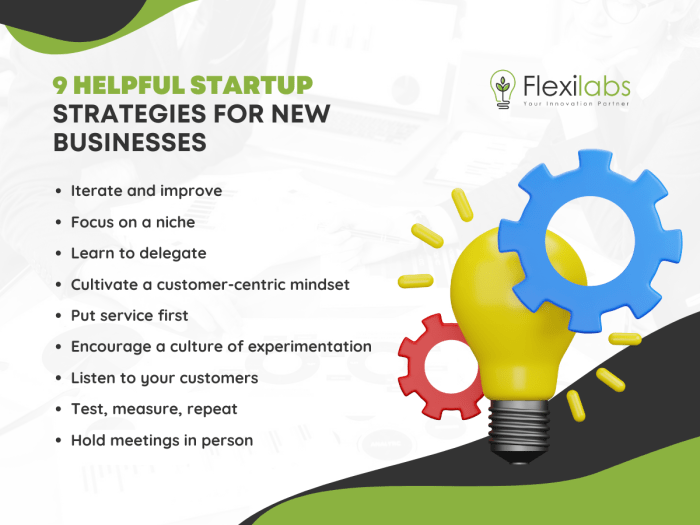Strategic Approaches for Successful Startup Launch Strategies
Embarking on the journey of startup launch strategies involves a careful blend of planning, innovation, and adaptability to navigate the competitive landscape of entrepreneurship. In this comprehensive guide, we delve into the essential components that make up a successful startup launch strategy, from market research and product development to branding and funding.
Let's explore the intricacies of launching a startup and the crucial steps to achieve lasting success in the dynamic business world.
Overview of Startup Launch Strategies

Startup launch strategies play a crucial role in the success of a new business venture. These strategies encompass a set of carefully planned actions and tactics aimed at introducing a new product or service to the market in a compelling and effective manner.
Key Components of Effective Startup Launch Strategies
- Market Research: Conducting thorough market research to understand the target audience, competition, and market trends.
- Unique Value Proposition: Defining a unique value proposition that differentiates the startup from competitors and resonates with the target market.
- Messaging and Branding: Developing a strong brand identity and crafting compelling messaging that communicates the startup's value proposition clearly.
- Product Development: Ensuring that the product or service meets the needs and preferences of the target market through iterative development and testing.
- Marketing and Promotion: Creating a comprehensive marketing plan that includes digital marketing, PR, social media, and other promotional activities to generate awareness and drive customer acquisition.
Common Challenges Faced During Startup Launch
- Funding Constraints: Securing adequate funding to support the launch phase and sustain operations until revenue starts flowing.
- Market Saturation: Navigating a competitive market landscape with established players and finding a unique positioning to stand out.
- User Acquisition: Acquiring initial customers and users can be challenging, requiring effective marketing strategies and customer acquisition tactics.
- Operational Challenges: Managing operational tasks such as logistics, supply chain, and customer support efficiently during the launch phase.
- Adapting to Feedback: Being open to feedback and iterating on the product or service based on customer input and market response.
Market Research and Analysis

Market research is a crucial step in the startup launch process as it helps founders understand the market landscape, identify potential customers, and make informed decisions. By conducting thorough market research, startups can minimize risks, optimize their strategies, and increase the chances of success.
Methods and Tools for Market Analysis
- Surveys: Sending out surveys to target audiences can provide valuable insights into customer preferences, needs, and pain points.
- Interviews: Conducting interviews with potential customers, industry experts, and stakeholders can offer qualitative data and deeper understanding of the market.
- Competitor Analysis: Studying competitors' products, pricing strategies, and marketing tactics can help startups differentiate themselves and identify gaps in the market.
- Google Analytics: Utilizing web analytics tools like Google Analytics can provide data on website traffic, user behavior, and conversion rates.
Informing Decision-Making
Market research insights play a key role in informing decision-making throughout the startup launch process. By understanding customer needs and preferences, startups can tailor their products or services to meet market demands effectively. Moreover, market research can help startups identify the most profitable market segments, optimize pricing strategies, and develop targeted marketing campaigns to reach their ideal customers.
Product Development and MVP
Product development and creating a Minimum Viable Product (MVP) play a crucial role in the success of startup launch strategies. The MVP is a version of a new product that allows a team to collect the maximum amount of validated learning about customers with the least effort.
Minimum Viable Product (MVP) and its Role
The concept of MVP is to quickly develop a basic version of a product with essential features to test the market and gather feedback. This helps startups validate their assumptions, reduce risks, and make necessary adjustments before investing more time and resources into building a fully-featured product.
- By launching an MVP, startups can test their product idea in the real market environment, receive feedback from early adopters, and iterate based on actual user interaction.
- Startups can avoid building a product that does not meet customer needs by focusing on delivering core functionalities that address the primary pain points of users.
- MVPs help in saving time and money by eliminating unnecessary features and concentrating on the essential aspects of the product.
Iterative Product Development and Lean Startup Methodology
Product development in startups follows an iterative process where continuous feedback and improvements drive the evolution of the product. This aligns with the principles of the lean startup methodology, which emphasizes rapid experimentation and validated learning.
- Startups create a feedback loop by releasing MVPs, gathering data, analyzing user behavior, and making informed decisions to enhance the product.
- The iterative approach allows startups to adapt to market changes, pivot the product direction if needed, and optimize resources effectively.
- Continuous iteration based on feedback leads to product-market fit, where the solution meets the needs of target customers and gains traction in the market.
Examples of Successful Startups with MVP Strategies
Several successful startups have leveraged MVPs to validate their ideas, attract early adopters, and scale their businesses:
1. Airbnb
Started with a simple website offering air mattresses for rent, Airbnb validated the concept and gradually expanded to become a global platform for booking accommodations.
2
. DropboxThe cloud storage service launched with a basic file-sharing feature, allowing the founders to test user interest and refine the product before adding more advanced functionalities.
3. Uber
Uber started as a black car service app in a limited market to validate demand and refine its service model based on user feedback before expanding to other cities and countries.
Branding and Marketing
Branding and marketing play a crucial role in shaping the success of a startup, especially during the launch phase. Establishing a strong brand identity and effectively reaching the target audience can set the foundation for long-term growth and sustainability.
Importance of Branding
Branding is essential for creating a unique identity for a startup in a competitive market. It helps differentiate the business from its competitors, build credibility with customers, and establish an emotional connection that fosters loyalty.
Marketing Channels and Strategies
There are various marketing channels and strategies that startups can leverage to reach their target audience effectively. These include:
- Search Engine Optimization () to improve online visibility and attract organic traffic.
- Social Media Marketing to engage with customers, build brand awareness, and drive traffic to the website.
- Email Marketing to nurture leads, communicate with customers, and promote products or services.
- Influencer Marketing to tap into the influence of popular personalities or industry experts to reach a wider audience.
- Content Marketing to provide valuable and relevant content that attracts and engages the target audience.
Role of Storytelling and Content Marketing
Storytelling and content marketing are powerful tools for building brand awareness and connecting with customers on a deeper level. By sharing compelling stories that resonate with the audience, startups can create a strong emotional bond and establish trust. Content marketing, on the other hand, allows startups to provide valuable information, showcase expertise, and engage with customers in a meaningful way.
Funding and Investment
When it comes to launching a startup, securing funding and investment is crucial for success. Startups need financial resources to support their growth, expand their operations, and bring their products or services to market. In this section, we will explore various funding options available to startups and discuss the importance of creating a solid financial plan as part of the startup launch strategy.
Funding Options for Startups
- Bootstrapping: Bootstrapping involves self-funding the startup using personal savings or revenue generated by the business. While this option allows founders to maintain full control over their company, it may limit the growth potential due to limited resources.
- Venture Capital: Venture capital involves raising funds from venture capital firms in exchange for equity in the startup. This option is suitable for startups with high growth potential and scalability. However, it often comes with stringent terms and conditions.
- Angel Investors: Angel investors are individuals who provide financial backing to startups in exchange for ownership equity or convertible debt. They often offer mentorship and industry connections in addition to funding.
- Crowdfunding: Crowdfunding platforms allow startups to raise funds from a large number of individuals who contribute small amounts of money. This option can help validate the market demand for the product or service and create a community of early adopters.
Importance of Financial Planning
Creating a solid financial plan is essential for startups to manage their resources effectively and make informed decisions. A financial plan helps founders set realistic goals, allocate funds strategically, and identify potential risks. It also provides a roadmap for financial stability and growth, guiding the startup through the challenges of the launch phase.
Team Building and Leadership
Assembling a strong team during the startup launch phase is crucial for the success of the venture. A cohesive and talented team can bring diverse skills and perspectives to the table, enabling the startup to overcome challenges and innovate effectively.
Key Qualities in Team Members
- Expertise: Look for team members with the necessary skills and experience relevant to the startup's industry and goals.
- Collaboration: Seek individuals who can work well in a team, communicate effectively, and contribute positively to group dynamics.
- Adaptability: Choose team members who are flexible and open to change, as startups often require quick adjustments and pivots.
- Passion: Find team members who are passionate about the startup's mission and vision, as this enthusiasm can drive motivation and dedication.
Delegating Responsibilities
Effective delegation of responsibilities is essential for maximizing team productivity and efficiency. Assign tasks based on team members' strengths and expertise, providing clear expectations and support to ensure successful outcomes.
Role of Leadership
- Visionary Guidance: A strong leader should provide a clear vision and direction for the team, inspiring and motivating members towards common goals.
- Decision-Making: Leaders must make informed decisions, considering input from team members and stakeholders to drive the startup forward.
- Support and Development: Leadership involves nurturing talent within the team, providing mentorship, and fostering a culture of continuous learning and growth.
Final Thoughts
As we conclude our exploration of startup launch strategies, it becomes evident that the path to entrepreneurial success is paved with strategic decision-making, resilience, and a relentless pursuit of innovation. By incorporating the key elements discussed in this guide – from market research to team building – aspiring entrepreneurs can embark on their startup journey with confidence and purpose.
Remember, the launch phase is just the beginning; the real challenge lies in sustaining and scaling your startup in an ever-evolving market landscape.
FAQ Summary
What role does storytelling play in startup launch strategies?
Storytelling is a powerful tool to connect with your target audience, convey your brand's values, and differentiate your startup in a crowded market.
How important is it to have a solid financial plan during the startup launch phase?
Having a solid financial plan is crucial to ensure the sustainability and growth of your startup, as it helps in managing cash flow and making informed financial decisions.
What is the significance of MVP in the context of startup launch strategies?
The Minimum Viable Product (MVP) allows startups to test their product idea with minimal resources, gather feedback from early adopters, and iterate based on real-world data.




